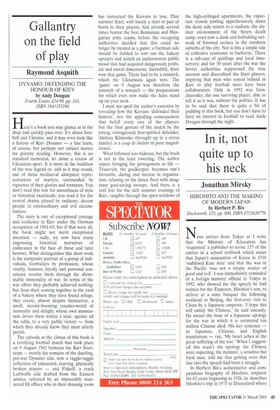Gallantry on the field of play
Raymond Asquith
DYNAMO: DEFENDING THE HONOUR OF KIEV by Andy Dougan Fourth Estate, .£14.99, pp. 243, ISBN 1841153184 Here's a book you may glance at in the shop and quickly pass over. It's about football and Ukraine, and it may even look like a history of Kiev Dynamo — a fine team, of course, but perhaps not subject matter for priority reading. However, this is no standard memorial, let alone a review of Ukrainian sport. It is more in the tradition of the true legend or, odd as it may sound, one of those mediaeval altarpiece representations of martyrs, surrounded by vignettes of their glories and torments. You don't read this text for smoothness of style or historical exactitude; you read it for the central drama played by ordinary, decent people in extraordinary and evil circumstances.
The story is one of exceptional courage and resilience in Kiev under the German occupation of 1941-43; but if that were all, the book might not merit exceptional attention — sadly, we now have many engrossing historical narratives of endurance in the face of these and later horrors. What distinguishes this short work is the composite portrait of a group of individuals, footballers by profession, whose vitality, humour, loyalty and personal conscience reunite them through the abominable immorality of war. In terms of the war effort they probably achieved nothing; but from their coming together in the yard of a bakery where they have found refuge, they create, almost despite themselves, a small, morale-boosting counter-world of normality and delight, whose own momentum drives them within a year, against all the odds, to a very public victory — from which they already know they must utterly perish.
The episode at the climax of this book is a terrifying football match that took place on 9 August 1942 between the Kiev Startteam — mostly the remains of the dazzling, pre-war Dynamo side, now a raggle-taggle collection of exhausted, starving, physically broken players — and Flakelf, a crack Luftwaffe side drafted from the Eastern armies, refereed by an impeccably mannered SS officer who in their dressing room has instructed the Kievans to lose. That summer Start, with barely a shirt or pair of boots to their players, had already several times beaten the best Romanian and Hungarian army teams, before the occupying authorities decided that this could no longer be treated as a game: a German side should be fielded to sort out the bakery upstarts and scotch an undercurrent public mood that had acquired dangerously political and moral dimensions. Incredibly, Start won that game. There had to be a rematch, which the Ukrainians again won. The 'game' on 9 August was therefore the rematch of a rematch — the preparations for which even now make the hairs stand up on your neck.
I must not spoil the author's narrative by revealing how the Kievans 'defended their honour', nor the appalling consequences that befell every one of the players, but the final gesture of the match by the young, outrageously free-spirited defender. Aleksey Klimenko (brought up in a circus family), is a coup de theatre of pure magnificence.
What followed was hideous, but the book is not in the least lowering. The author enjoys bringing the protagonists to life — Trusevich, the goalkeeper, becomes one's favourite, daring and tireless in organisation, relaxing on the dance floor with imaginary goal-saving swoops. And there is a real feel for the rich summer evenings of Kiev, tangible through the open windows of the high-ceilinged apartments; the expectant crowds jostling apprehensively down the dusty side streets to a stadium: the sinister environment of the Syrets death camp, even now a dank and forbidding network of forested ravines in the northern suburbs of the city. Nor is this a simple tale of collective resistance to barbarity. There is a sub-cast of quislings and local timeservers; and for 50 years after the war the Soviet authorities suppressed the true account and discredited the Start players, implying that men who stayed behind in Kiev to play football must have been collaborators. Only in 1992 was Goncharenko, the one surviving player, able to tell it as it was, without the politics. It has to be said that there is quite a bit of padding in this book, but you don't have to have an interest in football to read Andy Dougan through the night.














































































 Previous page
Previous page